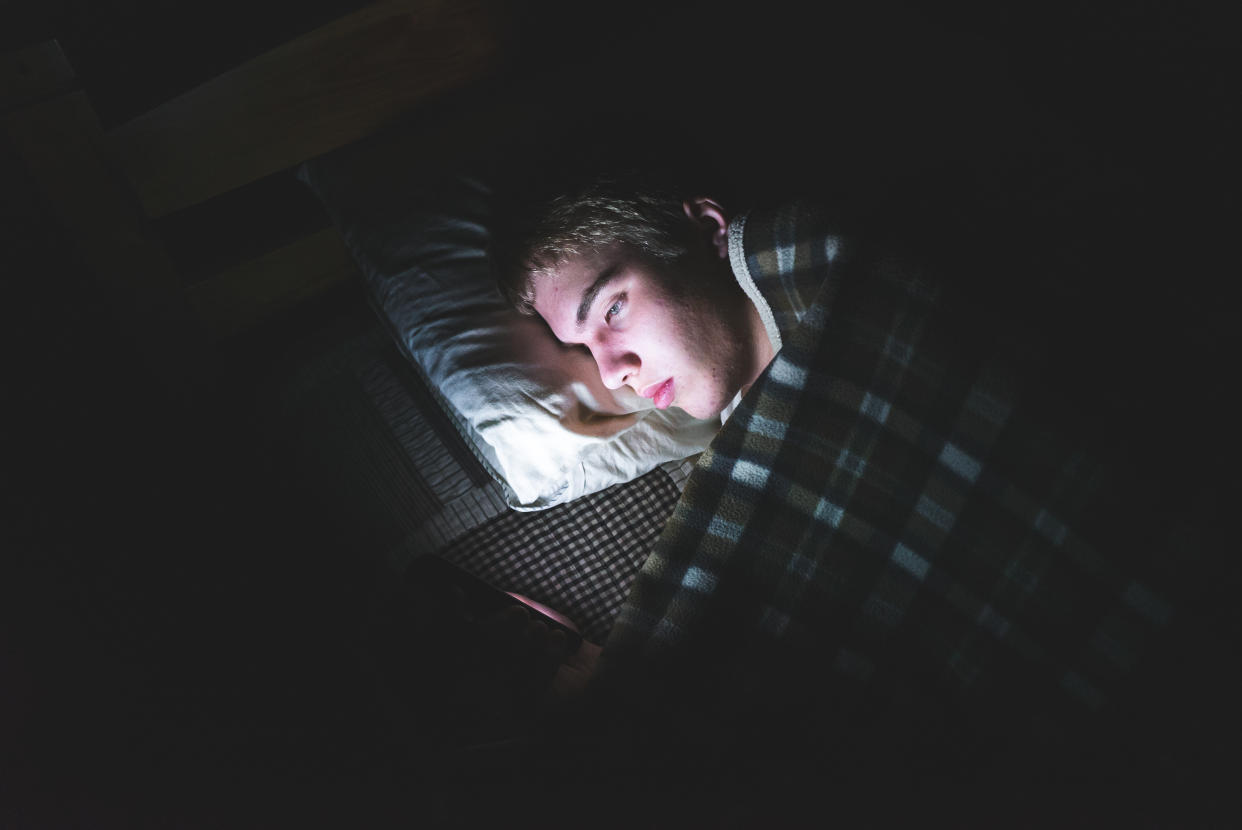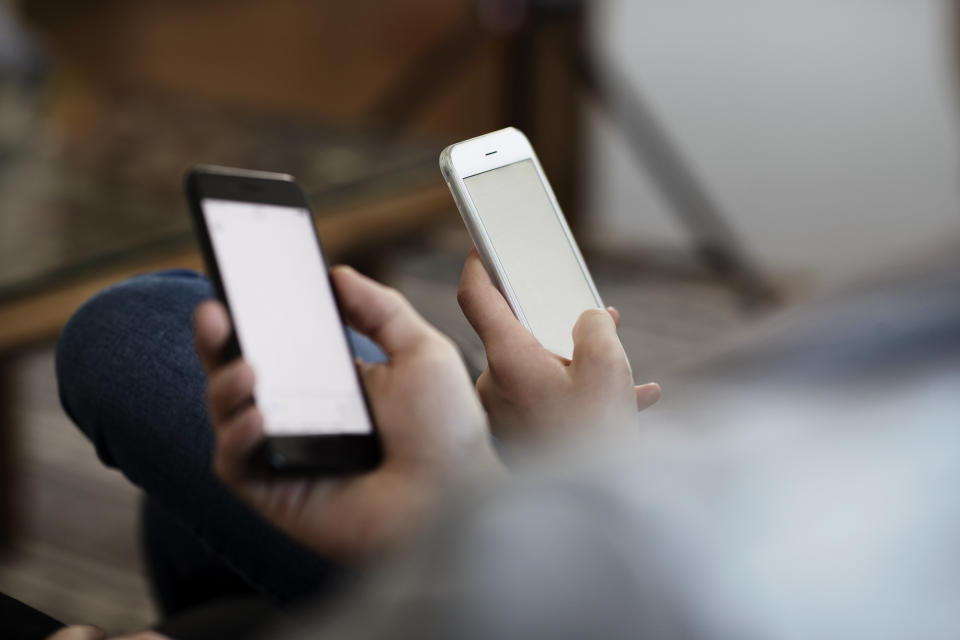What happens when teens don’t get enough sleep, according to doctors

Once upon a time, it seemed like all you wanted was your baby to sleep past 6 a.m. Fast-forward 15 years later and you’ve gotten your wish: in fact, you’re now dragging your teen out of bed every morning (and their kicking and screaming rivals their toddler years).
What happened? Blame it on puberty. “When kids go through adolescence, they experience a natural delay in their circadian rhythms because their bodies begin producing the sleep-inducing hormone melatonin later in the evening,” explains Nathaniel Watson, MD, co-director of the University of Washington Medicine Sleep Center in Seattle and a spokesperson for the American Association of Sleep Medicine. This means that while they were once yawning and rubbing their eyes by 8:30 p.m., now their bodies naturally gravitate towards sleep right around the time The Late Show with Stephen Colbert starts — and sometimes even later.
While this sounds good in theory — no more 5 a.m. impromptu wake-ups — it’s actually the start of a new nightmare. The American Academy of Pediatrics recommends all teens get between 8-10 hours of sleep a night. Yet, less than a fifth of all teens get the bare minimum eight hours required, according to a survey published last December by the Better Sleep Council. Their research found that almost 80 percent of all teens get seven hours or less of sleep a night, and an alarming two-thirds report clocking five to seven hours.
“They can’t get the sleep they need if school starts at 7:30 and they have to be on the bus by 6:45,” explains Michael Breus, PhD, a sleep specialist in Los Angeles and author of The Power of When. “That makes a teen who has to get up at 6:30 a.m. for school the equivalent of an adult who has to get up for work at 4:30 a.m. It’s doesn’t mesh with their biological clock, and it’s a recipe for disaster.”
The health impact of too little sleep

Physicians say they see the consequences of late-to-bed early-to-rise every day in their office. “It’s a sleep deprivation epidemic,” says Cora Breuner, MD, past chair of the American Academy of Pediatrics’ Committee on Adolescence and a pediatrician at Seattle Children’s Hospital in Seattle, Wash. “Six or seven hours of sleep may sound like a lot to an adult, but it’s not enough for a teen whose brain and body is still growing and developing.” When they don’t get the rest they need, she adds, that means the front lobe of their brain — which is responsible for attention and concentration, as well as executive functioning — suffers. “They find it harder to learn new facts, to focus on what they’re doing in the classroom and to articulate their thoughts,” she says. A study published by MIT researchers this past October in Science of Learning found that the less sleep college students got, the poorer their grades.
Related: Researchers Report Later School Start Times Helps Teens Sleep Better
But there are also other profound health consequences. Teens who routinely get less than six hours of sleep a night have four times the risk of depression as those who get enough rest, according to a 2014 study published in the journal Sleep. Another 2018 study published in the medical journal Pediatrics found that teens who skimp on sleep have higher blood pressure and cholesterol than those who get at least eight hours of snooze time a night. “This was after taking into account other factors like diet, exercise levels and how much TV they watched,” says Breus. One reason may be because when you are sleep-deprived, your body churns out more of stress hormones like cortisol to compensate, which can cause you to gain weight and impact your heart health.
The lack of sleep can also impact teen’s well-being by leading to shoddy overall lifestyle habits. “Many of my patients get up at 5:45 to make a 6:15 long bus, and they’re not allowed to eat on their hour-long ride, so they show up to class exhausted and starving and can’t eat until lunch,” says Dyan Hes, MD, Medical Director of Gramercy Pediatrics in NYC and clinical assistant professor of pediatrics at the Weill Medical College of Cornell University. “To make it through the day, they’re drinking tons of coffee or energy drinks like Red Bull. I had one girl come in who told me she drank venti Starbucks coffees with four shots of espresso several times a day. I was horrified — that’s more than enough caffeine to trigger a fatal arrhythmia!”
How to help your teen sleep better
The good news is teens’ biological clocks naturally shift back to an earlier wake up time at around age 20 or 21—just around the time they’re graduating from college and preparing to enter the work force. But in the meantime, parents have to grapple with the fallout. Here’s some expert approved advice on how:

Set a digital curfew. Electronic devices like TVs, tablets, smartphones and laptops all emit an artificial blue light that suppresses the release of melatonin, says Breus. “The more time a teen is in front of electronics in the evening, the greater the delay in the release of melatonin which can make sleep challenging,” he says. It’s not just that your teen sleeps fewer hours, either: the quality of their sleep can suffer. People who read from a screen before bed find it harder to wake up in the morning and feel alert, even if they sleep seven to eight hours, according to a 2015 Harvard study published in the Proceedings of the National Academy of Sciences. “I’m definitely the iPhone police: I go into my kids’ rooms at night and if they’re on their social media after about 10 p.m., I take it away,” says Hes, who has two teens, ages 13 and 16.
If your teen fights you, or has a project that involves them burning the midnight oil on their computer, Breus recommends blue blockers, glasses that filter out wavelengths in the blue part of the spectrum. (You can order blue blockers, such as Uvex Skyper, online.) One study published in 2015 in the Journal of Adolescent Health found that boys who wore blue blockers during the evening when they were glued to their computer or iPad felt significantly sleepier than those who wore clear lenses.
Be strict about bedtime. “Even though my kids fought me all through high school, I made sure they were in bed by 10:30 every night,” says Valerie Erde, a mom of two in Greenwich, Conn., who successfully convinced her school district to move high school start times an hour later in 2017. Sometimes that meant telling them they couldn’t participate in all the activities they wanted, or that they couldn’t watch the football game on TV, or that they couldn’t hang out with their friends one day after school. “It was actually good for them, because it taught them how to balance their homework and extracurriculars with their friend and family time,” Erde says. “They learned that they couldn’t always do it all, and that that’s part of life.”
Besides setting and sticking to regular bedtimes, Breus also recommends the power down hour. This means that the last 60 minutes before bed, teens take that first 20 minutes for activities that need to be done before morning, like getting their clothes laid out for the next day and packing their backpack. The next 20 minutes is for hygiene: they wash their face, brush their teeth, and even take their shower, before devoting the last 20 minutes to doing something relaxing like listening to music in their room or reading a book.

Advocate for later start times. Shifting school start times 30 to 60 minutes later may not seem like a lot, but it can have a profound shift on your teen’s academic performance. Teens at two Seattle high schools got just over a half hour more sleep after school times were pushed from 7:50 to 8:45, according to a December 2018 study published in Science Advances. But while it was just an extra 34 minutes of sleep, final grades for students were on average about 4.5 percent higher, and the number of tardies and first-period absences dropped dramatically. “We found that the teens still went to sleep at the exact same time — they just slept in later, which is what they clearly needed,” explains Breuner. You can find information on how to effectively lobby your school distract (including your Board of Education) at startschoollater.net.
Let them sleep in on Saturdays. While most sleep experts recommend sticking to a consistent sleep/wake-up time, if your teen is burning the midnight oil during the week it’s fine to let them sleep in on Saturday, says Breus (who has two teens himself). The only catch? Don’t let them do it on Sundays too. “If they wake up too late on Sunday, then they will have trouble falling asleep that evening, and will walk into school Monday morning once again sleep deprived,” he explains. And keep them on a tight sleep and wake-up schedule during the rest of the week. The MIT study also found that college students who kept consistent bedtimes performed better in school, regardless of how much sleep they got.

Stay away from sleep supplements. More than a third of all teens have tried over the counter or prescription sleep products, or the sleep supplement melatonin, to help them sleep, according to a 2018 survey done by the C.S. Mott Children’s Hospital at the University of Michigan. Long-term use of over-the counter sleeping aids, like Tylenol PM and antihistamines, have been shown to cause cognitive impairment in older adults and over time may have similar effects on teen brains. “Supplements like melatonin aren’t regulated by the FDA, so they’re not safe for teens either, since there’s no way to tell if they actually contain melatonin and if they do, how much,” says Cora Breuner, MD, past chair of the American Academy of Pediatrics’ Committee on Adolescence and a pediatrician at Seattle Children’s Hospital in Seattle, Wash. “They’re much better off practicing good sleep hygiene instead, which means staying off of electronics after a certain point, making sure they get some exercise in earlier in the day, and cutting out all caffeine after about 2 p.m.”
Read more on Yahoo Lifestyle:

